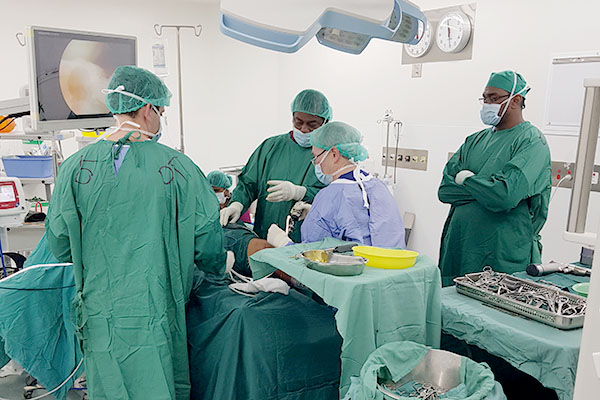Lautoka
After much anticipation the Government of Fiji announced in November 2018 that Aspen Medical was the successful selected bidder for the provision of health services under a public private partnership arrangement. Although the contract was only signed in January 2019, the commitment from Fiji to a public-private partnership for the Ba and Lautoka Hospitals will last beyond another 20 years. This decision is in line with the Fijian government’s announcement to modernise the Fiji health system.
Aspen Medical has experience throughout the Pacific, and over the past 15 years has managed hospitals, clinics and aero-medical evacuation services across Papua New Guinea, Solomon Islands, Timor Leste, Vanuatu and Kiribati.
The impending transfer of hospital management has led to an extended period of instability, impacting on surgical access combined with questionable sterility in using procedural rooms as operating theatres, low level willingness to facilitate repairs, an overall staffing insecurity led from uncertainty and resource allocations resulting in low staff morale.
There are complex challenges in providing supportive educational visits, with low level motivation to participate demonstrated locally. No dedicated operating time, limited imaging access, and a workforce largely reliant on junior medical officers with limited physical resources restrict the impact our teams can have. Instrumentation and implants critical to the care of surgical patients remain sealed in a damaged asbestos laden operating theatre from 9 months prior.
Our volunteers look forward to the completion of further restoration and redevelopment of Lautoka Hospital, which is of urgent need. The lack of access to a fully functioning operating theatre impedes essential levels of primary surgical care for the vast populations within its catchment.
Labasa
Andreas Loefler completed his 30th visit to Labasa during this term. The major development within Labasa is the commitment shown by Dr Alipate in establishing himself as the resident orthopaedic surgeon. The work is relentless, as orthopaedics easily accounts for 25% of all hospital admissions. As a method of sharing the workload, the general surgeons agree to manage the diabetic foot sepsis and the all too frequent amputations that follow. The local hospital administration acknowledges that orthopaedics requires both human and capital resources and there are plans for further recruitment of surgeons into the hospital.
Suva
Trauma remains the bulk of surgery that presents during our visits to the Colonial War Memorial Hospital, Suva. This includes complex acute trauma and patients presenting with secondary conditions as a result of the trauma, such as non-unions, malunions and infection.
Our teams outlined the use of the Ponseti technique to the local health professionals, and with an appreciation of the high incidence and sub-optimal management of club foot in Fiji, a unique training opportunity evolved. Surgeons, surgical trainees and physiotherapists representing all divisions across Fiji attended a Ponseti training course. The Ponseti training generated significant interest from the 32 participants, with immediate follow-up refresher courses scheduled for the coming year. This faculty itself was an international collaboration led by Peter Cundy and Helen Burgan, with the inclusion of Koen de Ridder from Wellington New Zealand.
Orthopaedic Outreach encourages all volunteer teams to make contact with the Australian High Commission in country as a mechanism of informing the Australian High Commission of the work that we do. The delegates in Suva are increasingly supportive of our programs, providing connections with freight forwarders Gibson Freight to assist in bulk shipping of donated supplies. Through the support of the McBain Foundation and Dotdash Australia, Orthopaedic Outreach have managed to provide an estimated $35,000 worth of new orthopaedic instrumentation and equipment for the Colonial War Memorial Hospital. The Fijian Ministry of Health have also agreed for secured storage space to be allocated within the Suva Pharmaceutical and Biomedical Services Centre for Orthopaedic Outreach specific items. This allows for repeat use instrumentation and equipment no longer requires expensive shipping, and can remain in-country for visiting team use as required.
Sterilisation and surgical site infection prevention remain key aspects
Post operative surgical site infection is problematic, with our volunteers concerned about the ongoing issues leading to an increasing infection risk. The issues are clearly multi-factorial in nature, and cause a significant impact on surgical outcomes and the capacity to undertake surgery of any complexity. Our volunteers have agreed to identify this as a high priority for future visits over the next 1-2 years.
Key aspects agreed upon with the senior orthopaedic surgical team include the requirement for a review of existing sterilisation practices, review of pre and post-operative surgical patient care in relation to surgical preparation and wound care, and the consideration of initiating a study on the effects and techniques used to reduce the risks of surgical site infection. Surgical skills transfer and clinical service provision will still feature, however the risks of a preventable disease from surgical infection are too great to ignore.

